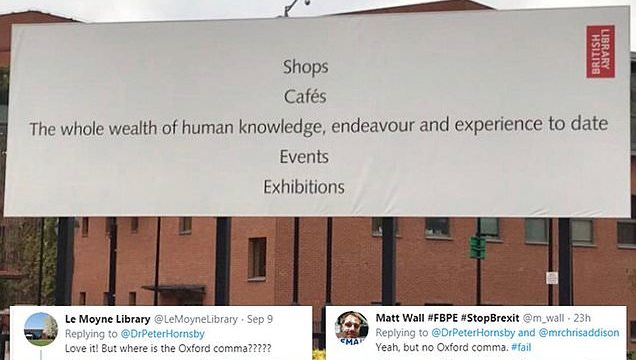British Library sends social media into meltdown by ‘missing’ an Oxford comma on an advert calling itself the ‘whole wealth of human knowledge’
- British Library sends Twitter into meltdown after it doesn’t use an Oxford comma
- Its advert states it has books on ‘human knowledge, endeavour and experience’
- Some social media users have said they ‘expected’ a comma after ‘endeavour’
The British Library has sent social media into meltdown, over a billboard that missed out on Oxford comma.
The library, which boasts the largest collection of books in the world, put up a new sign in London proudly stating that the library contains ‘the whole wealth of human knowledge, endeavour and experience to date’.
But some Twitter users have claimed it was grammatically incorrect, arguing there should be an ‘Oxford comma’ after the word ‘endeavour’.
The controversial punctuation, listed in the style manual of the Oxford University Press, is used to separate the final two items on a list of three or more items.
The British Library has sent social media into meltdown, after publishing an advert which does not use an Oxford comma after the word ‘endeavour’ (Pictured: The advert, above, believed to be in London)
But some Twitter users have claimed it is grammatically incorrect, arguing there should be a comma after the word ‘endeavour’ – a style change in punctuation, which was introduced by Oxford University Press to separate the final two items on a list.
Posting the advert on Twitter, writer Dr Peter Hornsby, wrote: ‘Great advert from the British Library’.
But his tweet quickly caught the attention of social media users who questioned where the Oxford comma had got to.
‘Love it!’, said one, ‘but where’s the Oxford comma?’
‘Of all places, I would expect the British Library to employ an Oxford comma’, wrote another.
The punctuation mark, used to separate two items in a list of three or more, was developed by Oxford University Press. They included the unique comma in their house style. (Pictured: Readers inside the British Library – stock image)
And a third said that the lack of an Oxford comma ‘is killing me’.
The punctuation mark, also described as a ‘serial comma’, is the final comma that comes before the conjunction in a list of three or more items.
Those who favour its use, claim that it’s essential to avoid confusion.
For instance, a sentence that reads, ‘I love my parents, Mary and John’, could be interpreted as the person saying their parents are called Mary and John.
What is the Oxford comma?
The punctuation mark, also described as a ‘serial comma’, is the final comma that comes before the conjunction in a list of three or more items.
The first printed references can be traced back to writer F.H. Collins, who published it in his Authors’ and Printers’ Dictionary in 1905, before it appeared in the Oxford University Press (OUP), and became a controversial staple in the Oxford Style Manual.
However, using the Oxford comma to say ‘I love my parents, Mary, and John’, indicates that they’re listing off their loved ones.
Critics would argue, however, that you can get around the issue by simply saying, ‘I love Mary, John and my parents.’
The first printed references can be traced back to writer F.H. Collins, who published it in his Authors’ and Printers’ Dictionary in 1905, before it appeared in the Oxford University Press (OUP), and became a controversial staple in the Oxford Style Manual.
In a statement to MailOnline, the British Library said it had received a ‘very positive response’ after the billboard went up earlier this month.
The British Library, founded in 1973, brought together several institutions to act as a single hub for the UK’s information network in order to aid scientific and technological research, business, the arts and humanities.
It contains an estimated 746 kilometres of shelves, the distance between London and Aberdeen, stacked high with books alongside over four million maps, 60million patents and seven million sound recordings on 19th century wax cylinders.
Source: Read Full Article






